|
December 14, 2017
Defend the Rights of All at Canada
Post!
Mediation Talks Break Down
at Canada Post
PDF
  
Defend
the
Rights
of
All
at
Canada
Post!
• Mediation Talks Break Down at Canada Post
• Background Information on Rural and Suburban
Mail Carriers
Workers Demand
Pro-Social Changes to Employment Insurance
• Seasonal Workers on the Acadian Peninsula
Fight for Adequate EI Coverage
• Unemployed Workers on Quebec's North
Shore Require
Immediate
Elimination of "Black Hole"
Justice for Injured
Workers!
• Spirited Outreach Actions in Ontario Affirm
Workers' Compensation is a Right!
Teachers and Education
Workers Refuse to Submit to Dictate
• Nova Scotia Teachers Union Files Charter
Challenge
• Ontario College Faculty Defend Their Working
Conditions
• Ontario K-12 Teachers Continue the Fight -
Laura
Chesnik
Defend the Rights of All at Canada Post!
Mediation Talks Break Down at Canada Post

The Canadian Union of Postal Workers (CUPW) announced in
a December 8 news bulletin a breakdown in mediated talks with Canada
Post. CUPW says it had hoped that the arbitrator would prompt Canada
Post to clarify its position why it will not pay wages to
the 8,000 Rural and Suburban Mail Carriers (RSMCs) according to
the
Route Management System. The company refused to explain its views and
stuck to its position of an arbitrary system, which results in a
two-tier system discriminating against rural and suburban mail
carriers. Over 70 per cent of RSMCs are female. The right of RSMCs
to achieve at least similar pay, benefits and working conditions as
urban
mail carriers is not recognized. Meanwhile the wages, benefits and
working conditions of urban mail carriers are also under pressure and
every effort is made by Canada Post to pit one section of workers
against another by suggesting that any improvement to the situation of
the RSMCs must come at the expense of the urban workers.
The arbitrator now has the final decision.
The talks have been going on for almost a year following the signing of
the contract on December 9, 2016, which contained a Memorandum of
Understanding calling for the establishment of a Joint Pay Equity
Committee composed of three members from each party. The committee was
mandated to investigate the issue of "gender based wage discrimination"
as it concerned the RSMC group and to provide appropriate remedies.
The position of CUPW on RSMC wages is that they should
be "based on time values set out in the Route Management System (RMS).
Routes are built using RMS values and the resulting pay is established
based on activity values outlined in the collective agreement. The CUPW
bulletin states:
"Although the time value assigned to each route can
vary depending on the activity values, the pay will be proportionate to
the assigned time. RSMCs in the same zone receive an identical base
salary for an identical number of hours.
"This is the equivalent of an hourly rate and,
accordingly, the best way to assess the wage gap between RSMCs and the
male-dominate[d] groups [within Canada Post]."
CUPW points out that Canada Post is hypocritical in
refusing to use the Route Management System for wages as the company
uses it "to create routes, pay employees, calculate pension benefits,
and record hours for employment insurance purposes."

Canada Post refuses to use the RMS for wages so it can
arbitrarily enforce lower wages on RSMCs. This unjust attack is
consistent with Canada Post's actions against postal workers throughout
the corporation.
At this time the Union is also at the beginning stages of negotiations
with Canada Post as the contracts of both RSMC and Urban Units are
expiring at the end of this year. On December 4, 2017, the Union’s
negotiating committee met with the corporation to present opening
statements on the program of demands and the corporation did the same.
In recent years, Canada Post executives and the federal
government have been engaged in a campaign to impose a two-tier wage
system throughout the corporation to split postal workers and weaken
their collective fight in defence of the rights of all. The corporation
now has workers working side by side who are not paid the same basic
wage, benefits and pensions. In addition, they are eliminating urban
letter carrier positions, undermining the existing letter carrier RMS,
extending routes, and turning new routes into RSMC routes at lower
wages making the lives of letter carriers more and more difficult.
Driving down the wages, benefits and working conditions
of all postal workers and increasing not decreasing different tiers of
workers and their terms of employment are creating conditions for
Canada Post to seize more of the value workers produce as a prelude to
privatization of the most profitable sections of postal services.
Stand with Postal Workers in Their Just
Struggle Against Privatization
and to Defend Their Rights!

Background Information on Rural and
Suburban Mail Carriers
Eight thousand Rural and Suburban Mail Carriers (RSMCs)
deliver mail in rural and suburban areas. Seventy per cent are women.

Roughly 50 per cent of RSMCs work out of offices
with urban letter carriers and postal clerks. The rest work with rural
postmasters who belong to the 12,000 member Canadian Postmasters
and Assistants Association (CPAA) directly affiliated with the Canadian
Labour Congress.
On September 30, 2003, RSMCs dramatically
changed their working conditions for the better upon ratifying a
collective agreement with Canada Post as members of CUPW. They had
forced Canada Post to recognize them as employees organized within a
union rather than as independent contractors in the precarious position
of
constantly renewing their contracts without the collective power of an
organization.
When considered individual contractors and not
employees, Canada Post kept RSMCs in a vulnerable position resulting in
low wages, no benefits, miserable working conditions and no security of
employment. As independent contractors, Canada Post often told the
RSMCs to accept a contract for less money or else they would lose their
route
and their job. As contractors, RSMCs had to pay for their own vehicle,
gas and other material value consumed during their work-time.
Responsible for much of the fixed and circulating transferred-value
consumed during their work-time, which was not fully returned to them,
and saddled with a precarious working arrangement with Canada Post,
many RSMCs consistently earned minimum wage or less.
Their first collective agreement as members of CUPW
came into effect on January 1, 2004. Since then, RSMCs
through collective class struggle for their rights have waged a
constant battle to improve their wages, benefits, pensions and working
conditions and bring them to a Canadian standard. The current
collective agreement
expires on December 31, 2017.

Workers Demand Pro-Social Changes to
Employment Insurance
Seasonal Workers on the Acadian Peninsula
Fight for Adequate EI Coverage
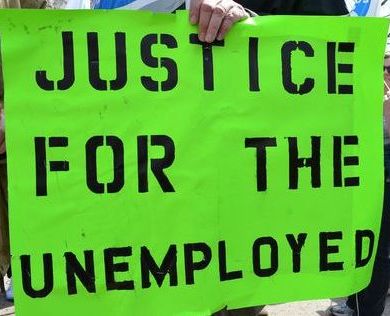 More than 300 workers
fighting for adequate
employment insurance attended a public meeting on Sunday,
December 10 in Inkerman, on the Acadian Peninsula. Workers in the
area make their living in seasonal industries and face a "black hole"
during the off-season in which they do not receive employment insurance
either. According
to media
reports, the meeting in the presence of Liberal MP Serge Cormier was
quite tense because workers no longer want to hear statements like "we
understand your situation" from those who claim to represent them. The
workers circulated a petition to increase pressure on the federal
government to ease the eligibility criteria for the employment
insurance program. Among other things, they are asking that the number
of hours worked to receive benefits be decreased from 490
to 360. More than 300 workers
fighting for adequate
employment insurance attended a public meeting on Sunday,
December 10 in Inkerman, on the Acadian Peninsula. Workers in the
area make their living in seasonal industries and face a "black hole"
during the off-season in which they do not receive employment insurance
either. According
to media
reports, the meeting in the presence of Liberal MP Serge Cormier was
quite tense because workers no longer want to hear statements like "we
understand your situation" from those who claim to represent them. The
workers circulated a petition to increase pressure on the federal
government to ease the eligibility criteria for the employment
insurance program. Among other things, they are asking that the number
of hours worked to receive benefits be decreased from 490
to 360.
Workers are challenging the arbitrariness and injustice
of the employment insurance regime. Unemployed workers deserve
compensation which permits them to live at the Canadian standard. It is
not the workers who destroyed the manufacturing sector in their regions
or who created instability in the economy. The standard of
living of workers and communities must be supported as a matter of
justice and redress from a system that does not provide a means of
subsistence to all. This is what the federal government is seeking to
avoid with its consultations and statements that it "understands the
situation of the unemployed." It wants to find ways to maintain the
arbitrariness of the regime and entrench the displacement of workers in
the name of what it calls "labor mobility," "flexibility" and other
high-sounding expressions. What it means is the uprooting of people so
that they are a disposable labour force which benefits the monopolies.

Unemployed Workers on Quebec's North Shore Require
Immediate Elimination of "Black Hole"

A demonstration was held in Forestville on Quebec's
North Shore on November 24 to demand that the federal government stop
dithering with its phony consultations and immediately adopt measures
that will stop the increased impoverishment of the population of the
North Shore, particularly the unemployed. The event, organized jointly
by the Action-Chômage Committee of the region, the National
Council of the Unemployed (CNC) and the Central Council of CSN
Côte-Nord (CCCN-CSN), was preceded by a press briefing to present
the main immediate demand of the people of the region: a threshold of
420 hours of work to qualify for 30 weeks of employment insurance
benefits. The event was attended by people from throughout the North
Shore, as well as members of Parliament, mayors and prefects.
The protest had a particularly urgent tone as official
federal statistics show that the unemployment rate in the Lower St.
Lawrence-North Shore Employment Insurance Economic Region fell to 6.9
per cent in November compared to 8.9 per cent in May. The consequence
is that the qualifying threshold for employment insurance has risen in
this region from 595 hours worked for 18 weeks of benefits, which is
already unbearable, to 665 hours worked for 15 weeks of benefits. This
means that more workers will simply be excluded from EI benefits. What
workers call the "black hole," the period when an unemployed worker has
no income after having exhausted EI benefits and not yet back to
seasonal work, will become even longer. This means greater
impoverishment, more debt, more stress and more exodus from the region.

The protesters had a lot to say about the absurdity of
the statistic that unemployment has fallen on Quebec's North Shore, and
particularly on the Upper North Shore where the work is mainly seasonal
and which is facing a pronounced exodus of workers. November is
actually part of the off-season. How could unemployment fall? The
exodus of workers itself becomes a factor in artificially "lowering"
the unemployment rate because one of the criteria for being considered
unemployed is to be actively seeking work. With the exodus of workers,
the number "actively seeking work" goes down. This arbitrary
categorization of EI economic regions, in which regions that are very
different industry-wise are mixed and with arbitrary averages that have
nothing to do with the actual situation of the unemployed and the
regional economy, shows how irrational the EI system is. With this
arbitrary designation and the consequences for unemployed workers, the
economic situation of these communities has taken a new hit with the
stroke of a pen. The demand for 420 hours of work for 30 weeks of
benefits aims to reduce this arbitrariness, to affirm the reality of
the living conditions and to fight against their continual
deterioration.
Workers' Forum spoke with Line Sirois,
coordinator of Action-Chômage Côte-Nord after the
demonstration on November 24, about their actions. She first mentioned
how proud she was that people from all over the region attended, and
that Members of Parliament, Members of the National Assembly and
several prefects and mayors were present. She added:
"We want people to qualify for 30 weeks of
employment insurance after 420 hours of work, and that this
measure apply retroactively from last July. That would immediately add
weeks of EI benefits and avoid the black hole after the holidays. We
are building a coalition in all the regions of eastern Quebec to
present the same
demands. The Minister does not need to consult and we do not want the
consultation to result in some triviality that we will be given before
the
next election. This immediate problem can be easily fixed. The
government has made more than $2 billion in surplus in the
employment insurance fund each year over the last two years. That money
belongs to the unemployed. It should not be diverted to the general
revenues of the government as it is currently done. It has to go back
to us."

 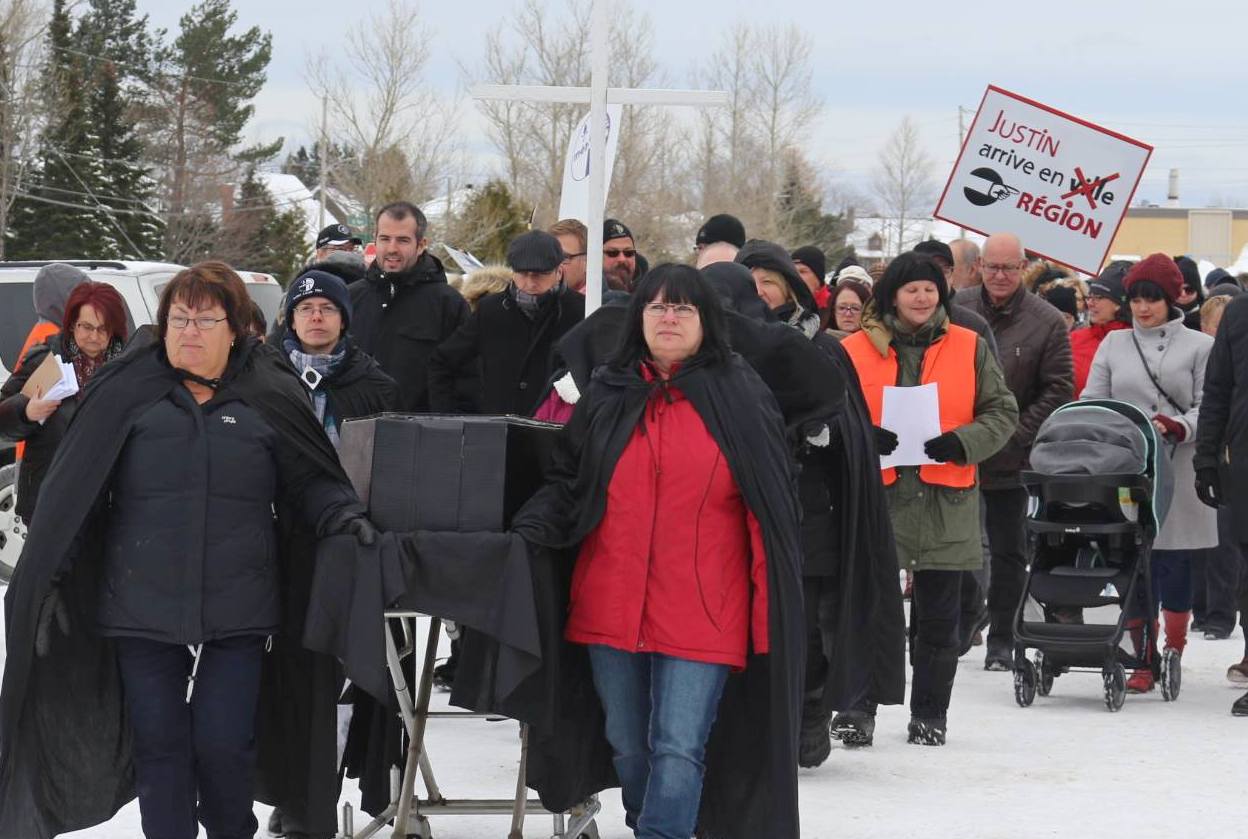

Justice for Injured Workers!
Spirited Outreach Actions in Ontario Affirm
Workers' Compensation is a Right!

Injured workers in communities around Ontario including
Toronto, Hamilton, Barrie, London, Windsor, Chatham and Thunder Bay
held pickets, rallies and outreach actions on December 11,
demanding that the right to full compensation of all workers injured
and made ill at work be met.
 The actions were organized
by the Ontario Network of Injured Workers' Groups as part of building
their province-wide campaign "Workers' Comp Is a Right." This year, to
assist in the mobilizing work, the Christmas demonstration, which has
been held at the Ministry of Labour and Workplace Safety and Insurance
Board (WSIB) in Toronto
for the past 25 years, was replaced by local actions. The
Christmas theme highlighted the hardships faced by injured workers and
their families during the holidays, as well as their impoverishment
throughout the year. The actions were organized
by the Ontario Network of Injured Workers' Groups as part of building
their province-wide campaign "Workers' Comp Is a Right." This year, to
assist in the mobilizing work, the Christmas demonstration, which has
been held at the Ministry of Labour and Workplace Safety and Insurance
Board (WSIB) in Toronto
for the past 25 years, was replaced by local actions. The
Christmas theme highlighted the hardships faced by injured workers and
their families during the holidays, as well as their impoverishment
throughout the year.
In Toronto, injured workers and their allies gathered
at busy Dundas Square during the lunch hour for a rally and outreach
blitz informing people about the campaign and gathering signatures for
their petition. Injured workers were joined by fellow workers from the
Canadian Union of Postal Workers, Ontario Public Service Employees
Union,
and the United Steelworkers, among others, and a contingent from the
Workers' Centre of CPC(M-L). The Toronto Raging grannies joined in with
their rewrites of Christmas carols such as "Deck the Halls with
Workers' Rights."
In Barrie, injured workers and supporters gathered at
the Service Ontario building, where injured workers end up applying to
the Ontario Disability Support Program for assistance when their
appeals are denied by the WSIB or they are forced to wait for years to
have appeals
heard. Injured workers were joined by workers organized in the Public
Service
Alliance of Canada and the International Association of Machinists and
Aerospace Workers. Service Ontario's response was to call the police in
a failed attempt to have the injured workers removed from a public
sidewalk to silence their voices.
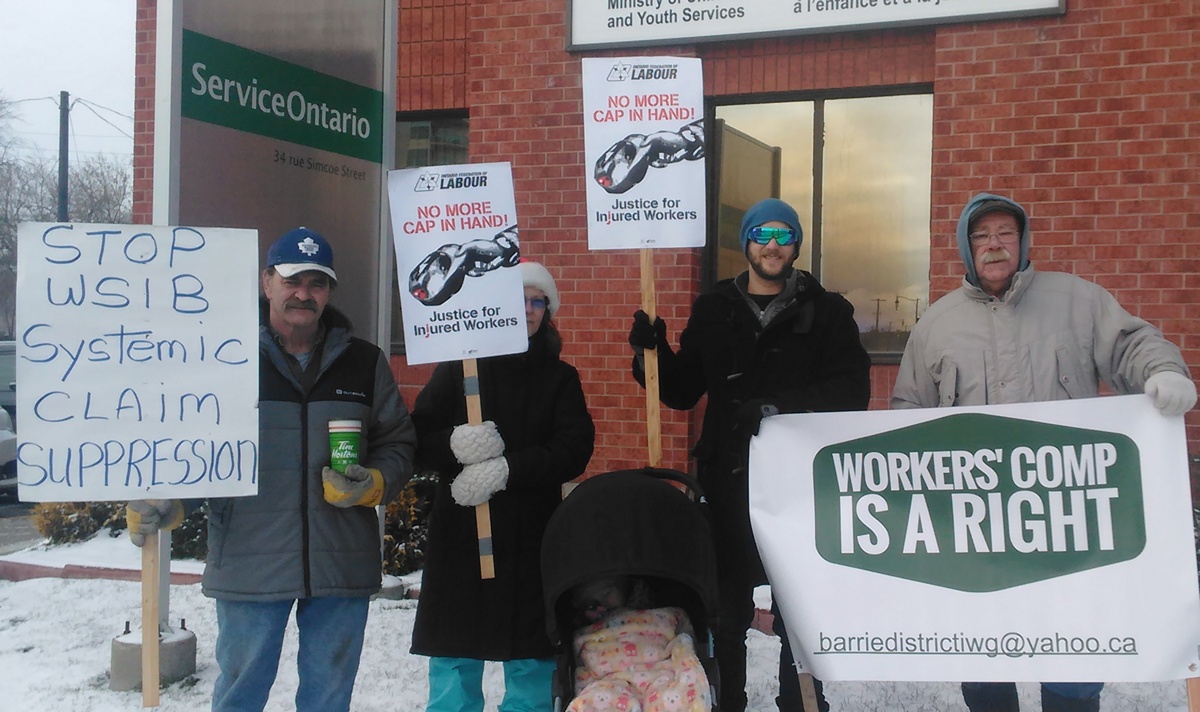 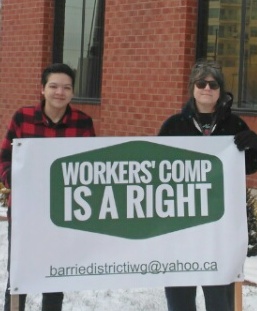
Barrie
In Hamilton injured workers and allies distributed
outside Jackson Square Mall, in Windsor, London and Niagara they
picketed and sung justice for injured worker themed Christmas carols
outside of the WSIB offices, in Thunder Bay they picketed the local
MPP's office and in London and Niagara they picketed WSIB offices.

Thunder Bay
Everywhere, the spirited actions expressed the
determination of injured workers to succeed in their just fight, which
is a fight for the right of all working people to have the security
that if they are injured or made ill at work they will be taken care of.
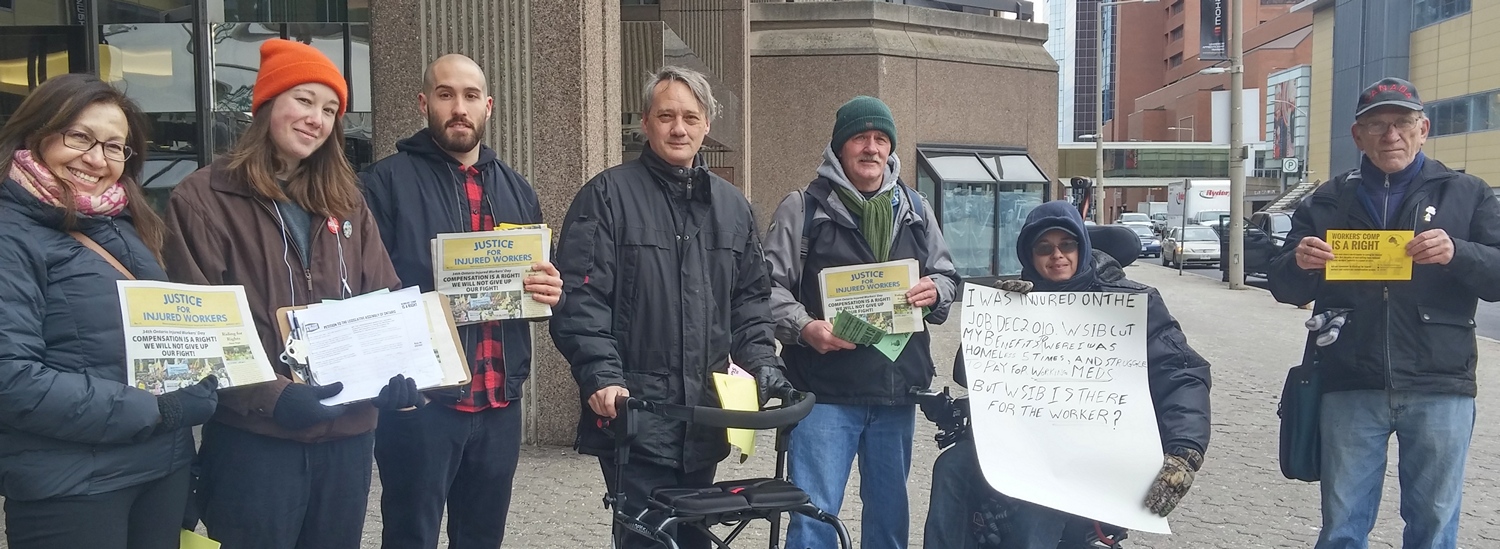
Hamilton
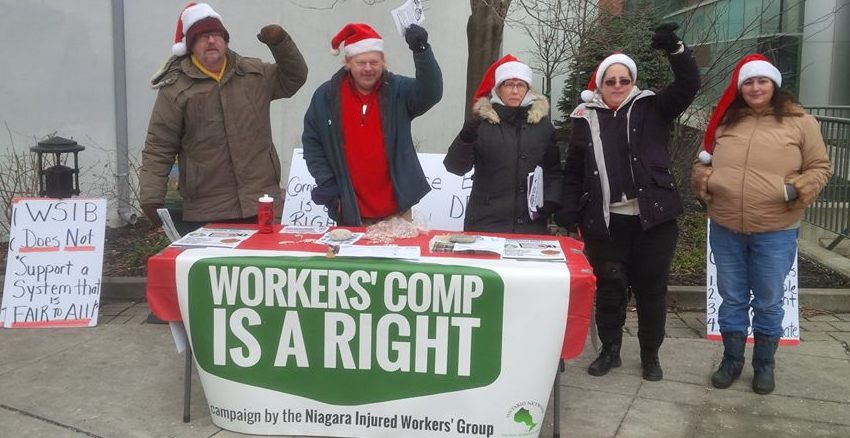
Niagara
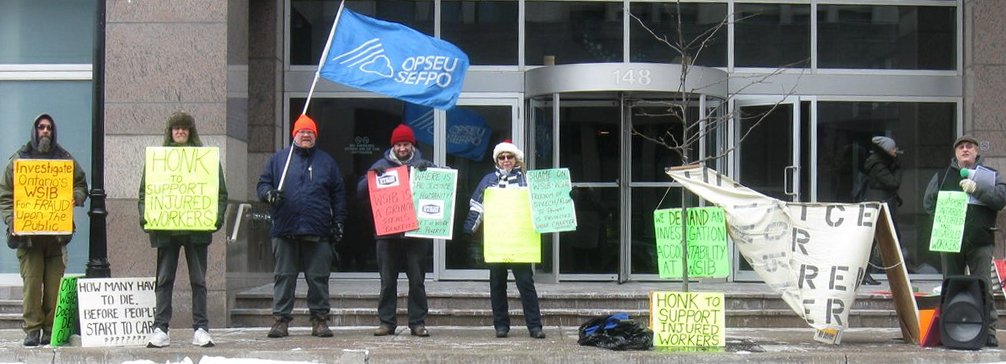
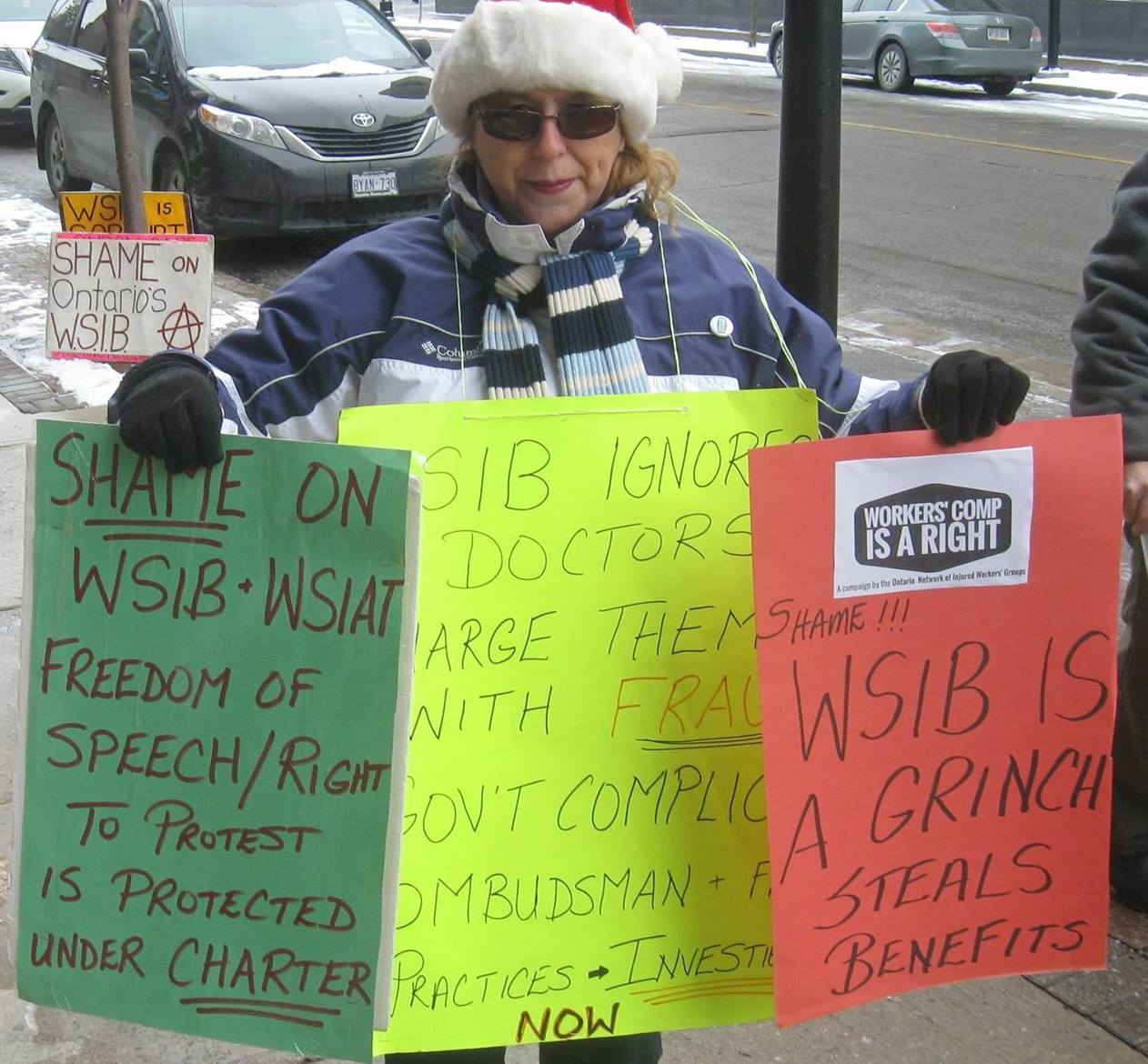 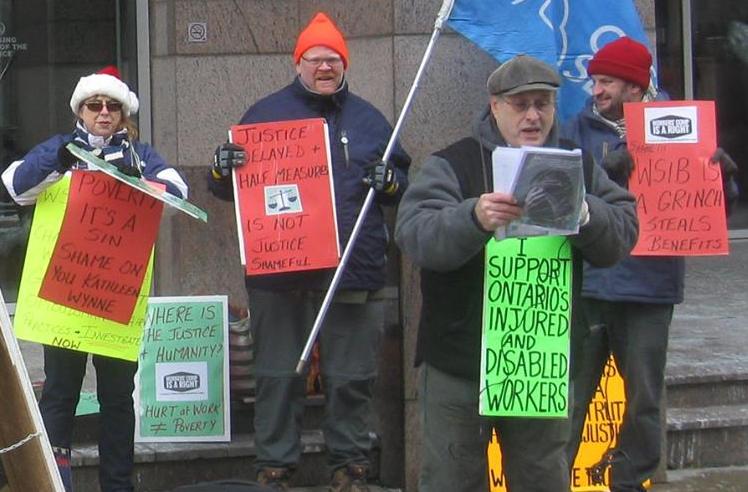
London

Chatham
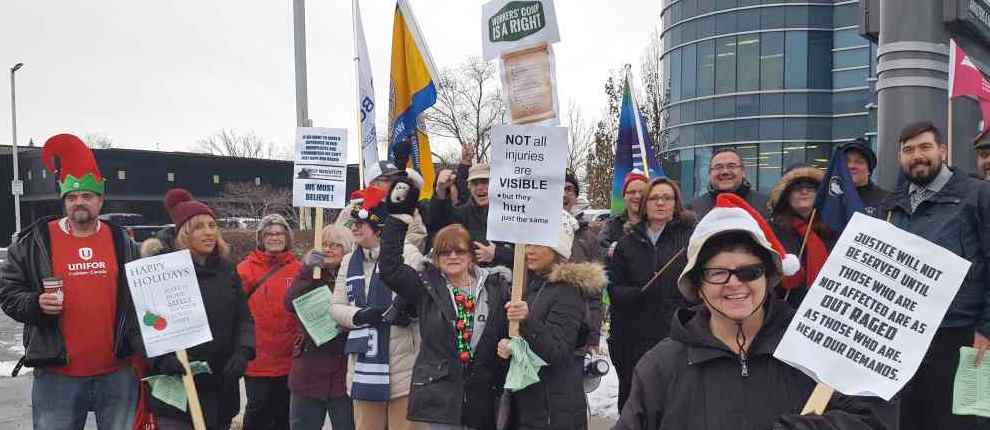
 
Windsor

Teachers and Education Workers Refuse to
Submit to Dictate
Nova Scotia Teachers Union Files Charter
Challenge
On November 23 court proceedings began for the
Nova Scotia Teachers Union (NSTU) Charter Challenge against the Liberal
government of Nova Scotia for legislation it used to impose contracts
in February of 2017. The challenge asserts that the McNeil
government's Bill 75, Teachers' Professional Agreement and
Classroom Improvements Act violates the right to freedom of
association and the right to freedom of expression as guaranteed by
Canada's Charter of Rights and
Freedoms.

The NSTU stated that Bill 75 "substantially
interfered with the collective bargaining process and infringed the
right to strike in violation of (their freedom of association)."
The union adds that their members' right to belief,
opinion and expression as guaranteed under the Charter is violated by
the bill's infringement on the teachers' right to protest or strike.
The NSTU asserts that the conduct of the government
before, during and after the failed negotiation of the teachers'
contract "failed to respect a process of meaningful and good faith
consultation and negotiation."
"We are committed to doing whatever is necessary to
ensure that the right to free and fair collective bargaining is
restored for teachers in Nova Scotia. We believe the government failed
to bargain in good faith as required under the charter and interfered
in the collective bargaining process," said Liette Doucet, president of
the NSTU, in an
emailed statement.
Tina Thibeau, the province's acting director of media
relations stated: "We stand by the legislation and believe that it will
hold up to a court challenge."
When it was enacted the legislation and the
government's threat to lock teachers and students out of their classes
was met with massive outrage from the teachers and the general
population who sided with the teachers, culminating in a one-day strike
outside the legislature and across the province, the first time Nova
Scotia teachers had ever
been on a full-out strike in the province's 122-year history.
Of note is that up to the point of the contract being
imposed, teachers had rejected three tentative agreements in 14
months -- all under the threat of an imposed contract -- because the
agreements did not address key matters relating to class size and
composition and salaries.
The NTSU is also part of another Charter challenge
brought forward by seven unions against the McNeil government's
Bill 148 which in September of this year imposed wages for the
next four years
on 75,000 public sector employees across the province.

Ontario College Faculty Defend
Their Working Conditions
Ongoing developments in the college education sector
reveal that
the Ontario Liberal government's use of dictate, far from resolving any
problems, has only made matters worse for students, faculty and the
college system itself.

Hundreds of grievances or workload complaints have been
filed across the
province
after the government forced an end to the strike without any
return-to-work protocols in place, including how to make up the five
weeks of lost instructional time and how the increased faculty workload
would be determined and compensated. Bill 178 merely called for
the
terms of the existing collective agreement, which expired in September,
to be followed until a new one is reached. That agreement limits
full-time faculty to 44 hours per week and ends the fall semester
on
December 15. Faculty have had to put in extra hours in make-up
time
without guarantee of being paid overtime or being paid at
all for increased workloads.
This situation has given rise to chaos and stress for
faculty and
students alike. CBC reported that by December 2 there had
been 45
grievances filed at one college alone. At La Cité Collegiale in
Ottawa,
four professors were suspended without pay because they could not in
good conscience sign a commitment guaranteeing that
students in their program will have acquired all the necessary
competencies with instructional time being cut by three weeks.[1]

In midst of all this, students contending with the
uncertainties of
successfully completing the semester, often while also trying to hold
down jobs, had to decide whether to proceed or withdraw and apply for a
tuition refund without being guaranteed readmission for the next
semester should spaces be filled. On December 12, the
government gave a preliminary figure of 25,700 full-time students
having withdrawn since November 1. Figures were not released for
part-time student withdrawals. CBC reported December 7
that 1,528 had
withdrawn from Centennial College in Toronto, 1,890 from Fanshawe
College in London, 1,200 each
from St. Clair College in Windsor and Conestoga College in Kitchener,
and 852 from Seneca College in Toronto.
Students have also raised complaints over the
inadequacy and
unfairness of the "financial aid" offered by the province to those
students who can provide proof of having suffered hardship due to the
strike, as well as other matters related to withdrawal from courses and
the return to class, how this affects payments on student loans and
more.
A recently formed group called Ontario Students United
has called a
province-wide walkout at colleges on Friday, December 14 at noon
over
the problems many students now face.[2]
Their demands include:
- $500 to be paid out to all students from the
"relief fund" instead of just those who can "prove" hardship.
- Refunds to students who have withdrawn to include all
services
fees, facility fees, parking and any others fees not mentioned, in
addition to tuition.
- Fairness for international students who were not
allowed to work
during the strike, in the form of special payment plans given the very
high fees they pay. Some were allegedly pressured by colleges not to
withdraw using the threat of potentially losing their visas.
Students are also being invited to join a class action
lawsuit
launched against the colleges for breach of contract and breach of the Ontario
Consumer
Protection
Act.[3]
Mediation-Arbitration Under Back-to-Work Legislation
Begins
The Ontario Public Service Employees' Union (OPSEU),
representing
faculty in the provinces' 24 colleges, reports that the union and
the
College Employer Council have agreed on William Kaplan as
mediator-arbitrator. Kaplan will mediate "negotiations" for a new
collective agreement or, if that is not possible, he will impose one
within the parameters dictated in Bill 178, the Colleges of
Applied Arts and Technology Labour Dispute Resolution Act, the
back-to-work legislation the Liberals and PCs passed to end the strike.[4]
Beginning December 12, the College Employer
Council and OPSEU filed
briefs on disputed issues. Kaplan will meet with union representatives
December 14 and employer representatives December 15. Two
days of
mediation are to follow on December 16 and 17. If a new
collective
agreement is not reached
through mediation, arbitration of unresolved matters is expected to
begin in early to mid-January. Bill 178 directs the arbitrator to
finalize the new collective agreement no later than 90 days after
being
appointed, though the deadline can be extended if both parties agree.
Meanwhile, OPSEU's court challenge to Bill 178 based on
the bill's violation of faculty rights under the Charter of Rights
and Freedoms will proceed.
Notes
1. "Four Ontario Faculty
Suspended for Refusing to Submit to College Dictate" Workers' Forum,
December 7, 2017
2. See Ontario Students United on Facebook.
3. See here for information on
class action.
4. William Kaplan is a lawyer who
works as a
mediator and arbitrator. He is also an author who has written numerous
books. His most recent book, Why Dissent Matters, was released
in June and has received considerable attention in Canadian media.
On Kaplan's website there is a long list of cases that
he has
arbitrated either alone or as part of a three-person board. Most are
interest arbitration cases (as opposed to grievance arbitration). Many
are in education, health care and other public sector fields. He was
the arbitrator appointed to impose an agreement in 2006 after
an 18-day strike by Ontario college faculty did not result in a
negotiated settlement between OPSEU and the colleges at that time
either.
In August 2016, he was appointed to intervene as a
"special
mediator" between the Canadian Union of Post Workers and Canada Post at
a time when postal workers had threatened to strike in support of their
contract demands. The agreement that was reached is the one currently
in force. He was also appointed as mediator by the Nova
Scotia government after it intervened to end an 18-month strike by
reporters, photographers, editors and support staff at the Halifax
Chronicle Herald, which had continued publishing using scabs.

Ontario K-12 Teachers Continue the Fight
- Laura Chesnik -

Teachers and education workers rally outside Liberal Party leadership
conference
in Toronto,
January 26, 2013.
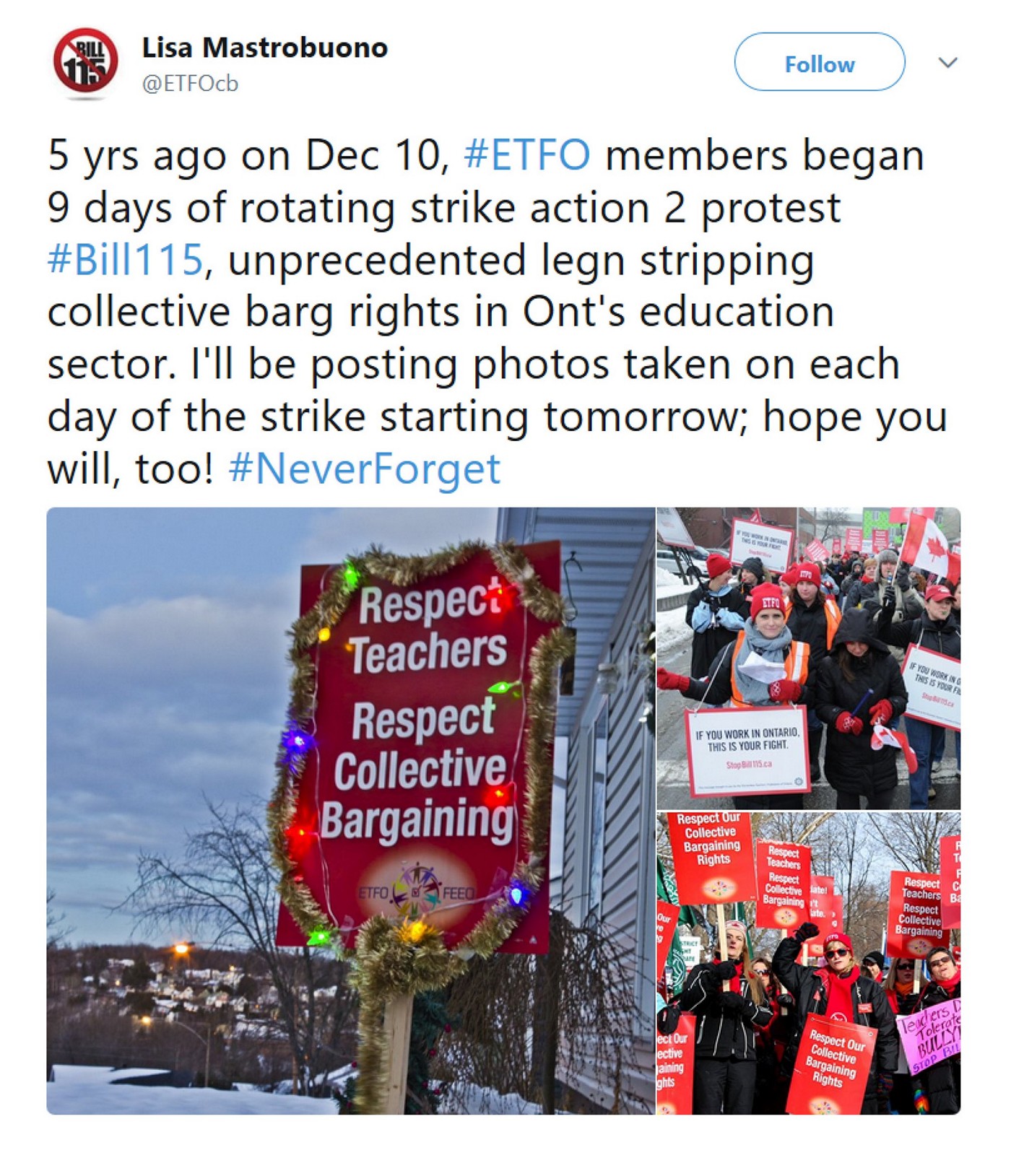 As 2017 comes to an end,
Ontario teachers and education workers continue to fight for their
rights. On December 9, elementary teachers and other education
professionals organized into the Elementary Teachers' Federation of
Ontario (ETFO) launched a social media campaign to commemorate the
beginning of their province-wide strikes five years ago on December 10.
It coincides with another round of mediated talks with the government
over a remedy after the courts affirmed that it violated fundamental
freedoms in the 2012 round of negotiations. Those negotiations were
ended by the government when it imposed contracts through legislation. As 2017 comes to an end,
Ontario teachers and education workers continue to fight for their
rights. On December 9, elementary teachers and other education
professionals organized into the Elementary Teachers' Federation of
Ontario (ETFO) launched a social media campaign to commemorate the
beginning of their province-wide strikes five years ago on December 10.
It coincides with another round of mediated talks with the government
over a remedy after the courts affirmed that it violated fundamental
freedoms in the 2012 round of negotiations. Those negotiations were
ended by the government when it imposed contracts through legislation.
The strikes in 2012 were a direct challenge to the
threats to pass legislation that permitted the government to impose
contracts and refuse to negotiate. Billions of dollars were taken out
of public education mainly through the government's cuts to sick days.
Thousands of ETFO members and supporters engaged in those actions which
hit almost every town and city in the province and involved much of the
population in saying No! to
dictate and attacks on workers' rights.
|
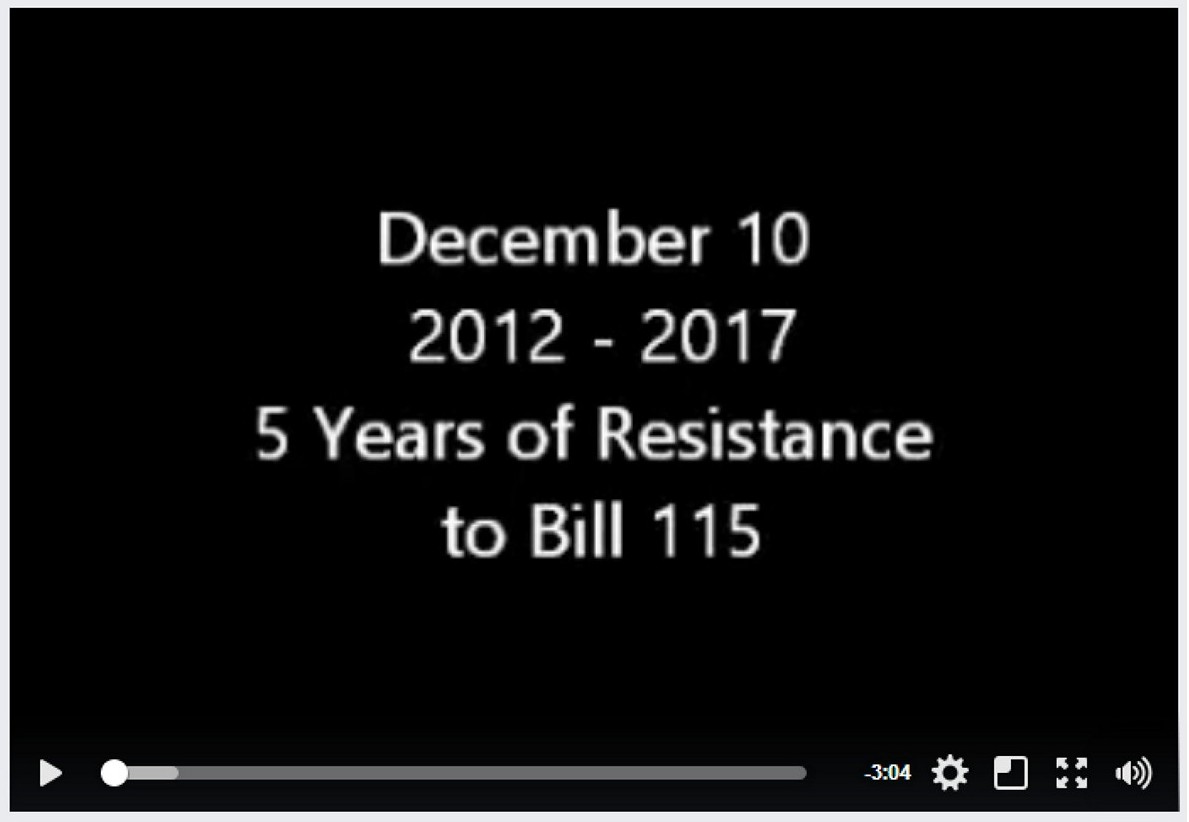
Slideshow produced by Greater Essex EFTO celebrates 5 years of
resistance to dictate and defending workers' rights.
Click on image to view video.
|
The social media campaign began with a slide show
produced by the Greater Essex ETFO unit. It has now expanded, with each
district tweeting and posting pictures of their strike day during the
2012 rotating strikes. The slide show itself has been viewed some 3,500
times and counting and is actively being shared across the province and
country with the Nova Scotia Teachers Union, the Canadian Teachers'
Federation and others who are sharing it with their members.
The campaign is assisting teachers and education workers
and those they are linked with to recall their direct experience in
standing up for their rights in 2012. This is something the so-called
major political parties would rather the teachers and education workers
forget as Ontario goes into the 2018 election year.
Reports now inform that mediation on December 9 and 10
has failed to produce an agreed remedy for Bill 115 between ETFO and
the government, and that the same judge who ruled in favour of the
unions before will be forced to decide on a remedy -- something the
parties originally requested he not do in order to try and come up with
a remedy themselves (see below). The government will now also be forced
to speak to its egregious violation of rights in open court. Meanwhile,
it is trying to confuse matters by suggesting that there is a
progressive version of the anti-social neo-liberal austerity agenda.
Information on the Mediation Process
Unions representing teachers and education
workers in Ontario who were involved in the 2012 provincial
negotiations in the K-12 education sector in 2012 launched a court
challenge arguing that the government at the time violated their right
under the Canadian Charter of Rights and Freedoms to collective
bargaining. The 2012 round of provincial negotiations culminated with
the government using Bill 115, the Putting Students First Act,
to impose contracts that stripped billions out of public education. At
the time, Ontario had a minority government in which the McGuinty
Liberals were one seat shy of a majority. The Hudak Progressive
Conservatives sided with the Liberals to ensure the government could
pass the bill.

The court eventually affirmed that the Ontario
government violated the Charter rights of those involved. Justice
Thomas Lederer, released his decision on
April 20, 2016. In his ruling, Lederer left it up to those
who challenged Bill 115 to try to arrive at a remedy with the
government outside of the court but if
that failed, he would decide the remedy. He however gave his
unsolicited opinion to impose a definite framework within which those
whose rights were violated should approach talks with the government to
try to agree on a remedy. He told them that if they could not come to
an agreement outside of the court he would not likely redress the
wrong that was done. Thus, instead of resolving matters the judge
set a tone for the mediated talks that would follow to ensure the
government's neo-liberal austerity agenda was maintained. He said that,
"The fact remains that Ontario was and may still be in a difficult
fiscal circumstance. If so, we are all affected. Ontario accepted that
it should
act. The problem with what took place is with the process, not the end
result. It is possible that had the process been one that properly
respected the associational rights of the unions, the fiscal and
economic impacts of the result would have been the same or similar to
those that occurred." [...]
"At the moment (without having heard any submissions),
it is not clear to me what would be accomplished by any substantial or
overly aggressive remedy. Could it reward one side to the detriment of
the process as a whole? We are all still learning."[1]
The Liberal government then proceeded to launch a
two-pronged attempt to avoid accountability for its actions. First it
offered the unions involved the option of extending their
existing contracts beyond the next provincial election on the
condition that there be no local bargaining. At the same time it
offered certain monetary
measures as a remedy to the court case. Although these were really two
separate tracks they took place at the same time. All the unions in
K-12 education negotiated extension agreements with the government,
eliminating local bargaining, while all but the ETFO also came to an
agreement on a
remedy. In June, ETFO announced it had been unsuccessful in
reaching a remedy with the government. EFTO President Sam Hammond
stated: "ETFO's Provincial Executive has decided that the principle of
fair remedy for the losses suffered by ETFO members due to
Bill 115 needs to be honoured. What the government has
proposed doesn't address that principle."
In accordance with the 2016 court ruling on Bill 115 if
the parties were unable to come to an agreement between themselves the
remedy was to be sent back to Justice Lederer for a decision. However,
instead of
ruling, which would have required the parties making their cases
publicly on what they felt an appropriate remedy would be, re-exposing
all that had been done during that period of dictate, Lederer sent ETFO
and the
government to mediation. December 9 and 10 were the dates set
for mediation. Reports indicate that the talks have ended without an
agreement on a remedy and it will now go back to the judge for a
ruling.
Note
1. See "Court
Ruling
on
Ontario's
Bill 115:
Teachers
and
Education
Workers
Win
Another
Battle
for
Rights"
Ontario Political Forum,
April 25, 2016.

PREVIOUS
ISSUES | HOME
Website: www.cpcml.ca
Email: office@cpcml.ca
|







 More than 300 workers
fighting for adequate
employment insurance attended a public meeting on Sunday,
December 10 in Inkerman, on the Acadian Peninsula. Workers in the
area make their living in seasonal industries and face a "black hole"
during the off-season in which they do not receive employment insurance
either. According
to media
reports, the meeting in the presence of Liberal MP Serge Cormier was
quite tense because workers no longer want to hear statements like "we
understand your situation" from those who claim to represent them. The
workers circulated a petition to increase pressure on the federal
government to ease the eligibility criteria for the employment
insurance program. Among other things, they are asking that the number
of hours worked to receive benefits be decreased from 490
to 360.
More than 300 workers
fighting for adequate
employment insurance attended a public meeting on Sunday,
December 10 in Inkerman, on the Acadian Peninsula. Workers in the
area make their living in seasonal industries and face a "black hole"
during the off-season in which they do not receive employment insurance
either. According
to media
reports, the meeting in the presence of Liberal MP Serge Cormier was
quite tense because workers no longer want to hear statements like "we
understand your situation" from those who claim to represent them. The
workers circulated a petition to increase pressure on the federal
government to ease the eligibility criteria for the employment
insurance program. Among other things, they are asking that the number
of hours worked to receive benefits be decreased from 490
to 360.





















